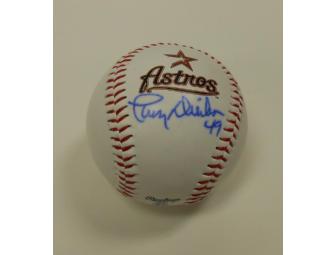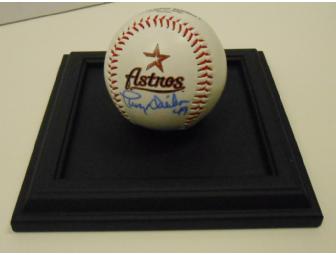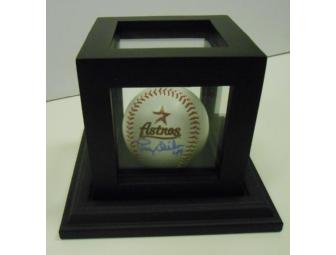Houston Astros Larry Dierker Autographed Baseball

Item Number: 107
Time Left: CLOSED


Description
Lawrence Edward Dierker, the man whose name would one day become synonymous with Houston baseball, was born in Hollywood, California on September 22, 1946. His professional career with the Houston Astros has spanned four decades and his success on the field, behind the microphone and in the dugout, has made him one of the few players to have his uniform number retired by the team.
Larry Dierker's baseball career started at the age of 7 in the West Valley Little League. By the time of his high school graduation ten years later, Dierker had matured into a lanky, 6'4", 190-pound pitcher
pursued by 18 of the 20 major-league teams. The Chicago Cubs and the Houston Colt .45s were his biggest suitors and Dierker signed with the Houston because he knew the fledgling franchise represented his best chance to reach the major leagues.
He was right. Immediately after signing with the .45s, Dierker was sent to pitch for their Instructional League team in Cocoa, Florida. After nine starts, the teen had struck out 55 batters and allowed just 20 hits in 39 innings. General Manager Paul Richards then promoted Dierker to the majors to make his first major-league start on his 18th birthday, barely three months out of high school. Dierker would lose the game, but made a big impression when he struck out sluggers Jim Ray Hart and Willie Mays in the first inning. After the game, the team celebrated his arrival with a post-game birthday cake.
Larry would never step on a minor-league pitching mound again. The following year, the team was renamed and moved into the modern and spacious Astrodome. The 18-year-old phenom was kept on a strict 110 pitch-count limit per start, but he was able to manage a complete game among his 19 starts. He became a full-time starter in 1966, making 29 starts and brandishing an impressive 3.27 ERA in 187 innings. Dierker's 1967 season ended early on June 25 when he began a six-month stint in the Army Reserve. By 1968, Dierker was 21 and had become a quality workhorse for the team's pitching staff.
Thanks to poor run support, he finished with a 12-15 record despite posting a 3.31 ERA over 233 innings.
It was during the 1969 season that Larry Dierker would completely rewrite the team's record books. The team stalled to its worst start in franchise history, limping to a 4-20 record after the first month of the
season, already 12 1/2 games out of first place. Amazingly, the team caught fire, going 71-45 over the next four months to close within 2 games of first place. It was the first pennant race for the team and was documented by reliever Jim Bouton in his must-read book, "Ball Four."
Dierker's season was a key component to the team's success. He completed a staggering 20 of his 37 starts, racking up an astonishing 305 innings, posting an amazing 2.33 ERA while becoming the first 20-game winner in franchise history. Towards the end of the season, Dierker suffered what he would later call one of the toughest losses of his career. After shutting out the Braves over 12 innings on September 12th, Dierker watched closer Fred Gladding blow a 2-0 lead, giving up 3 runs in the bottom of the 13th. The loss crushed the young team, which went on to lose 15 of its final 21 games to finish with a .500 record.
In 1970, Dierker tossed 270 innings and won 16 games, but the team slumped and finished under .500. In the following season, the heavy load of being the team's workhorse began to take its toll on Dierker's arm. At 25, he was already a 7-year major-league veteran with 1250 innings under his belt, but soon developed a "sore arm", the first of a series of ailments that would haunt him throughout the rest of his career. After a 10-1 start that earned him a spot on the 1971 All-Star team, Dierker's troubles began, slipping him to a 12-6 record.
Dierker's offseason recuperation seemed complete in 1972 when he made 31 starts, completing 12 and winning 15 games over 214 innings. Shoulder problems flared up in 1973, however, limiting him to just 3 starts. He recovered in the following year to toss 224 innings with a sharp 2.89 ERA, picking up his 100th career win along the way.
Dierker won 27 games in his final two seasons with the team, tossing the only no-hitter of his career on July 9th, 1976, shutting out the Montreal Expos 6-0. After the season, he was traded to the St. Louis Cardinals for catcher Joe Ferguson. Unfortunately, he broke his leg in the following Spring Training and tossed just 39 innings for the Redbirds before announcing his retirement.
His career with the Asros was not over, but beginning a new phase. Dierker returned to Houston in 1978 to work in the promotions department and soon began providing color commentary on the team's televised broadcasts. That inauspicious beginning launched a 19-year career in broadcasting for Dierker, cementing his position as one of the most respected and admired personalities in Houston.
Special Instructions
Case included. All bids and sales are final on Monday, October 29, 2012 at 8:00 p.m. CST. No exchanges or refunds on any items are permitted except where specified.
The winning bidder’s credit card will be charged after the auction closes. Shipping cost will be billed directly to the bidder unless the bidder sends notification via email that he/she would like to make arrangements for the items to be picked up at our Houston office.
An email notifying Family to Family Network that the bidder would like to pick up their items at the Houston office must sent by email to f2fdevelopment@sbcglobal.net before Wednesday, October 31, 2012 3:00 p.m. CST to avoid shipping charges. If the bidder resides out of
the Greater Houston area and has won multiple items, all items will be shipped together and the bidder will be charged directly for shipping costs. Family to Family Network is not liable for any auction items once shipped (by postage mark date) to the bidder.
Please note that some items have specific expiration dates--any changes in specified date must be arranged directly with donor. Family to Family Network will not be responsible to either change or extend dates.
Reservations for trips, lessons and/or use of facilities must be mutually arranged with the donor unless otherwise indicated.
Values listed are estimated by the donor and are not warranted by Family to Family Network. In cases where a fair market value is not specified, please check with your tax advisor as to the tax deductible of individual items.